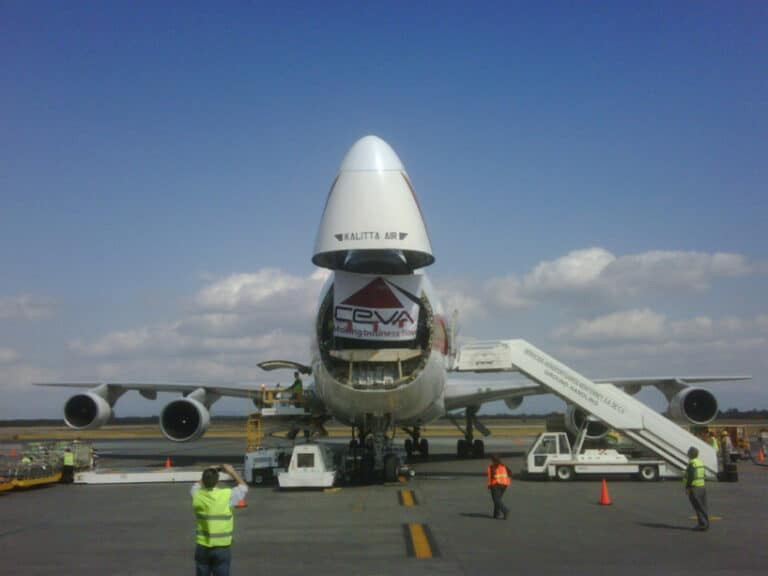CEVA Logistics, part of the CMA CGM Group, remains committed to “Acting for the Planet” in celebration of this week’s two global events—World Environment Day (June 5) and World Ocean Day (June 8). The company’s focus on respecting the environment is one of its three main CSR pillars and a key lever in its corporate strategy for the future. CEVA is taking tangible action today, with an eye on the solutions of tomorrow.
The CMA CGM Group, including CEVA Logistics, aims at becoming net zero carbon by 2050. The Group is significantly investing in research and development to improve its direct operations and help the emergence of future energy sources and technologies to reduce the impact of transport and logistics on the planet.
Overall reduction in CEVA’s footprint, growth in decarbonization measure
CEVA Logistics is reducing the carbon footprint of its warehouses (34% with low carbon electricity; up from 22% in 2022), investing in low emission vehicles (tripled the number in operation during 2023) and finding more sustainable solutions with carriers for the transport purchased for its customers. CEVA reduced its overall CO2 emissions by 200,000 tons last year (6.2 MT in 2022 to 6.0 MT in 2023).
CEVA Employees Participate in CMA CGM Group Planet Days
For two days—June 6-7—CEVA employees will join the other 160,000 employees of the CMA CGM Group in taking action through various projects aimed at preserving the environment: more than 60 activities will take place in 50 countries, such as awareness-raising workshops, reforestation, beach cleanups or volunteering with partner organizations.
In addition, the Group’s Biodiversity Project of the Year award will reward the unwavering commitment of the teams in charge of projects supporting international and local partners in preserving endangered species and fragile ecosystems around the world.
Continued progress on short-term initiatives toward decarbonization
CEVA Logistics is addressing Scope 1, 2 and 3 emissions through a strategic plan of three main levers. The company will continue to evaluate and extend its plans in order to sequentially improve its operations and the wider industry to arrive at its net zero goal by 2050.
CEVA’s near-term sustainability approach rests on three key areas:
1. 1. Making energy efficiency improvements in our more than 900 global warehouses by 2025.
CEVA will use 100 percent low-carbon electricity to power its global warehouses by 2025.
In addition, the vast majority CEVA Logistics owned, leased warehouses were switched LED lighting by the end 2023. The company now continues to incorporate new sites from recent acquisitions into its all-LED commitment. With the new facilities included, the company was at 84 percent LED coverage by the end of 2023.
Finally, CEVA’s solar panel surface area will increase significantly by 2025. The company expects to have approximately 1.8 million square meters of solar panels installed at its facilities—an area 2.25 times the size of France’s famed Palace of Versailles.
2. 2. Investing in electric and low emission vehicles (trucks and vans) for CEVA’s ground operations.
CEVA is targeting 1,450 EVs in its Ground logistics operations by 2025 to reduce annual carbon emissions by an estimated 67,000 tons of CO2. The commitment includes 1,000 delivery vans, 300 straight trucks and 150 tractor units deployed across CEVA’s dedicated fleet operations, LTL and last mile pick and delivery operation.
3. 3. CEVA will continue to engineer more sustainable solutions for the transport its purchase from carriers for its customers.
With 95% of CEVA’s greenhouse gas emissions coming from the transport purchase from air, ocean and ground carrier partners (Scope 3), the company is working with customers, carriers and end-consumers to change the global supply chain. The cost of decarbonization must be shared by. This effort requires educating shippers and end consumers about the cost of decarbonization.
Estimates place the cost at ~$1.5 trillion to decarbonize maritime freight; and ~$1 trillion to decarbonize air cargo. But for only ~$0.70 more on a smartphone, the CO2 impact of air transport could be reduced by 75% with SAF (air biofuel); and for ~$0.40 more on a TV, the CO2 impact of maritime transport could be reduced by 84% with maritime biofuel.
CEVA is working directly with customers to explore more decarbonization levers and find ‘Better Ways’ to transport their products, while maintaining a high level in our quality of service. Specific areas of emphasis in CEVA’s solutions offering include:
- Flow and loading optimization
- Route optimization
- Modal shift and multi-modal
- Carrier selection by CO2 performance
- Low-carbon fuels (SAF for air freight; biofuel for ocean freight; electric, biodiesel, biogas for road freight)
- Waste management (“reduce, reuse, recycle”).




